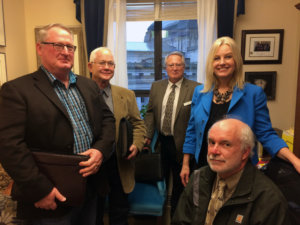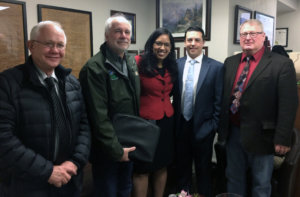20 Mar Communicating, Connecting, and Collaborating with Policymakers
The regular state legislative session alternates in length each year between 105 days and 60 days. This year’s state session was a short one, but the League still secured dedicated time to speak with policy makers about the Columbia Basin Project (Project). Those who traveled to the state capitol in January to join lobbyist Mike Schwisow in advocating for the Project included Chair Kevin Lyle, Vice Chair Jeff Schibel, Dale Pomeroy, Matt Hawley, and Assistant Director Sara Higgins.
BROAD POLICY AND PROJECT INTRODUCTION
Broadly, the League advocated for policies supporting overall Project infrastructure reinvestment as well as continued Odessa Ground Water Replacement Program (OGWRP) construction and design. Participants provided a copy of the League’s new film, Waiting for Water, to every policymaker they met with and thanked legislators for OGWRP funding ($15 million) included in the FY2017-2019 budget. Participants also took the opportunity to inform policy makers of the League’s position on the Columbia River Treaty (Read more at: www.cbdl.org/key-principles-for-a-new-columbia-river-treaty).
The League annually travels to Olympia. This year’s trip included an opportunity to introduce some policymakers previously unfamiliar with the Project and its value.
Meetings included:
Sen. Kevin Van De Wege, D-24th – Senate Ag, Water, Natural Resources & Parks, Chair
Jon Rudicil, L.A. for Sen. Frockt, D-46 – Senate Ways & Means, Vice-Chair Capital
Sen. Judy Warnick, R-13th – Senate Ag, Water, Natural Resources & Parks, Ranking Minority
Rep. Strom Peterson, D-21st – Capital Budget, Vice Chair
Rep. Mary Dye, R-9th – Capital Budget
Rep. Tom Dent, R-13th – House Ag & Natural Resources
Rep. Kristine Reeves, D-30th – House Capital Budget
Mary Verner, DOE Water Resources Program Manager
HIRST SOLUTION AND THE CAPITAL BUDGET
A carry-over from last year’s session—a permanent Hirst solution and passage of the capital budget—were both accomplished in the third week of the new year.
A Supreme Court decision in October of 2016, known as the Hirst decision, prevented many rural property owners from accessing water from exempt wells. The uncertainty it created for families, communities, and local governments was not palatable. Instead of a one-size-fits-all approach, state legislators reached a bipartisan compromise that resulted in differing impacts across the state’s 62 watersheds. The highlights of the compromise are:
- $300 million over the next 15 years to be spent on instream projects determined by a committee of state and local governments, tribes, and interest groups including agriculture
- In more than 40 watersheds, fees and daily withdrawal limits will remain as they were prior to the Hirst decision
- In seven Eastern and Western Washington watersheds there will be a new, $500 fee to drill a well and average annual withdrawals will be limited to 3,000 gallons per day
- In eight Western Washington watersheds the new fee will apply but the withdrawal limit will be 950 gallons per day
Passage of the 2017-19 $4.18 billion capital budget was tied to the Hirst solution as part of legislative negotiations. Since the negotiations continued into 2018 with no 2017-19 budget going into effect in 2017, the budget that ultimately passed effectively became the supplemental budget. There were no significant changes to the supplemental budget.


